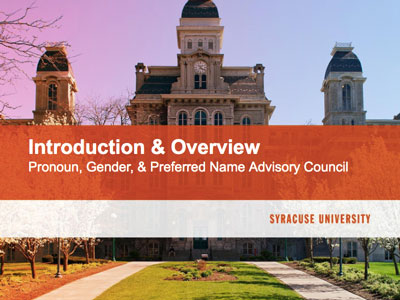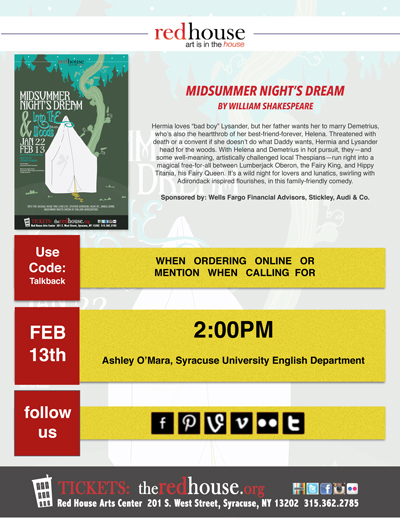Whether I’m in the classroom or on the stage, my teaching philosophy leads me to connect what we learn with how we engage with the world. At Syracuse University, I work with the LGBT Resource Center and the Pronouns, Gender, and Preferred Name Advisory Council to design and deliver diversity and inclusion trainings for professional development; I also teach classes on writing, gender, race, and English literature for the College of Arts and Sciences. In the community arts scene, I have worked with The Redhouse to lead audience conversations on theatrical performances. I practice a feminist pedagogy: my teaching style aims to level hierarchies in the classroom. This way, I learn as much from my students as my students learn from me, as I mentor them from wherever they’re at to wherever they want to go.
Diversity and Inclusion
 Pronouns Competency Workshop, Syracuse University (ongoing).
Pronouns Competency Workshop, Syracuse University (ongoing).
I co-lead 60-90 minute sessions on the role of pronouns and preferred names as a part of LGBTQ inclusion and cultural sensitivity. We consider the function and role of gender in our lives, practice using pronouns in common situations, and learn how to increase accurate personal pronoun usage in our professional practice.
Community Arts
 Talkback to Sarah Ruhl’s Passion Play, The Redhouse, 9 April 2016.
Talkback to Sarah Ruhl’s Passion Play, The Redhouse, 9 April 2016.
“Hailed by the New Yorker’s John Lahr as ‘extraordinary,’ ‘bold,’ and ‘inventive,’ Passion Play takes us behind the scenes of three communities attempted to stage the death and resurrection of Christ. From Queen Elizabeth’s England to Hitler’s Germany to Reagan’s America, Ruhl’s exploration of devotion takes us on a humorous yet unsettling journey filled with lust, whimsy, and a lot of fish.”
I led an after-performance audience discussion on early-modern religion and theater, and its enduring impact on the politics of Christianity.
 Talkback to William Shakespeare’s A Midsummer Night’s Dream, The Redhouse, 13 February 2016.
Talkback to William Shakespeare’s A Midsummer Night’s Dream, The Redhouse, 13 February 2016.
“Hermia loves ‘bad boy’ Lysander, but her father wants her to marry Demetrius, who’s also the heartthrob of her best-friend-forever, Helena. Threatened with death or a convent if she doesn’t do what Daddy wants, Hermia and Lysander head for the woods. With Helena and Demetrius in hot pursuit, they—and some well-meaning, artistically challenged local Thespians—run right into a magical free-for-all between Lumberjack Oberon, the Fairy King, and Hippy Titania, his Fairy Queen. It’s a wild night for lovers and lunatics, swirling with Adirondack inspired flourishes, in this family-friendly comedy.”
I led an after-performance audience discussion on early-modern marriage, gender, and sexuality.
### Classroom Instruction I have developed lower-division college courses on composition through the lens of gender in world religions; a survey of British Literature, Beginnings to 1789; Race and Literary Texts; and Gender and Literary Texts. I also give guest lectures on subjects related to my research.
I have developed lower-division college courses on composition through the lens of gender in world religions; a survey of British Literature, Beginnings to 1789; Race and Literary Texts; and Gender and Literary Texts. I also give guest lectures on subjects related to my research.
- Race and Colonialism in The Tempest, ETS 121: Introduction to Shakespeare (Evan Hixon), Syracuse University, 12 April 2018.
- Gender and Sexuality in Hamlet, ETS 121: Introduction to Shakespeare (Evan Hixon), Syracuse University, 27 March 2018.
- Queer Representation in the BBC Sherlock Fandom, ETS 145: Reading Popular Culture (Rhyse Curtis), Syracuse University, 15 November 2017.
First Day Roster Form
In order to get to know my students and how I can help best teach them, I created this form that all students complete on the first day or when they add my course. Highlights include asking for students’ pronouns and content warnings, for what their interest is in the class, and for what their expectations are for themselves and the instructor.